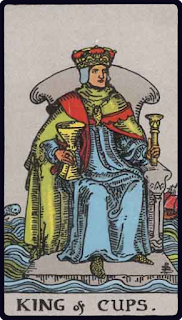
Representing the paternal nature; the King of Cups finds balance in obligation and discipline. Our love for others and devotion to them, and our self-love and devotion to the self, are kept in equilibrium here. The King of Cups portends stability and authority over the domain of emotions and feelings.
In the upright state the King of Cups promises clarity and resolution with a particular focus on our future role as an authority on these matters to whom others will turn for advice and counsel. The King finds balance between wisdom learned and the dispensation of that wisdom. The King knows when to speak and when to reserve judgement, recognising in others the difference between what they want and what they need.
In the inverted state the King of Cups represents a warning not to intervene when called; others will often seek counsel not out of the desire for clarity but out of the desire to delegate responsibility for their actions, seeking confirmation of their intent so that any repercussion can be attributed to that confirmation not to their decision, or to blame failure on your disapproval and lack of belief within them where you denied their intentions. Be careful of the wisdom you dispense and recognise when to allow others to make their own mistakes.
In the Rider-Wait deck this balance between wisdom and obligation is depicted by a King sat upon a throne stable and even upon a tumultuous sea beneath. The King holds in one hand a Cup representing their emotional knowledge and experience gained, and a sceptre in the other representing their obligation and authority.
In self-reflection the King of Cups serves as a prompt to consider the balance between your sense of openness and your sense of secrecy and reflect on the trust you have in your relationship and how much you communicate.
Consider what you have learned from the relationship and how you can use that to improve your other relationships. Ask yourself “What have I learned from this experience?” and reflect on what the relationship has taught you about relationships in general as opposed to specifics concerning the other parties.
Where this specifically relates to your emotions and feelings the question can instead be put as “How can I use what I know to maintain a healthy emotional state?” and reflect instead on what you have learned from the way you treat yourself, and consider your current state as the product of this action.

No comments:
Post a Comment
All comments are moderated before they are published. If you want your comment to remain private please state that clearly.